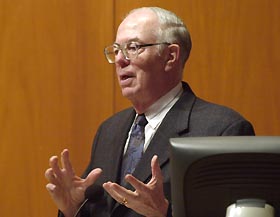|
This is an archived
article. For the latest news, go to the Advance Homepage
For more archives, go to the Advance Archive/Search Page. |
||
|
Inclusive Approach Can Help The way to tackle terrorism at its roots is to build inclusive societies, and that requires the involvement of citizens outside government, says a former U.S. diplomat who spent 25 years at the center of American foreign policy-making. Although governments do have a role, an effective response to terrorism calls for combining the activities of governments and citizens, according to Harold Saunders, director of international affairs for the Kettering Foundation, a foundation that researches how democracy works.
Saunders was the speaker for this year's Gerson Foreign Policy lecture March 26 in the Konover Auditorium. The annual lecture series, named for Louis Gerson, professor emeritus and former head of the political science department, brings distinguished individuals whose careers have spanned policy making and scholarship, to speak at UConn. Saunders served on the National Security Council in the White House under Presidents Kennedy, Johnson, Nixon, and Ford, and was appointed assistant secretary of state for Near Eastern and South Asian affairs under President Carter. He was a key member of the U.S. team that mediated five Arab-Israeli agreements, and he also helped negotiate the release of American hostages from Tehran. Since leaving government in 1981, he has built on his experience of negotiating between competing groups, seeking to improve relationships strained along ethnic and racial lines. His work has taken him to political hotspots all over the world. "There is not a decent civil war I have not been to," he joked. Saunders said his focus on relationships dates back to the 1973 Arab-Israeli conflict. Shortly before that war began, his wife died. He then went to Egypt and to Israel for talks, arriving in Israel the day the casualty figures from the war were announced. Prime Minister Golda Meir sympathized with Saunders for his loss, commenting that they had much in common because she had lost people too. "I realized then that I was not just a diplomat dealing with government-to-government interaction, and I decided if I ever forgot that as an American diplomat I am dealing with human beings in pain, I would not be doing my job. Since then I have focused on relationships between people in conflict," he said. Transforming relationships between conflicting groups is something that can only be done by citizens, he said. But while governments can use "tried-and-true instruments" such as mediation and diplomacy to negotiate their political goals, citizens have had no such tools. So Saunders and his colleagues developed a model they call "sustained dialogue," a public peace process designed to change relationships among those in deep-rooted human conflicts. He said formal interaction between governments is only part of the political picture. "Politics is about relationships, of which power is just one component," Saunders said. "We must recognize that the greatest untapped resource for dealing with the challenges of this new century is the citizens outside government." He recounted his experiences in Tajikistan, a small country, newly independent after the demise of the Soviet Union, that soon degenerated into "vicious civil war." A joint team of Soviets and Americans, including Saunders, worked with the Tajik people to facilitate dialogue between the various groups in an effort to resolve the conflict. They identified as crucial to the process the need to include not just some but all the parties to the conflict. "One of the roots of terrorism is the exclusion of people from the political process," said Saunders, adding that this exclusion was the reason for the civil war. Groups were established in six regions of the country to engage in dialogue. In one, an elderly man stood up and said, 'We know who the extremists are; they live on our streets, they even live in our homes. We need to draw them into the dialogues." Saunders noted that in Tajikistan, one of the 10 poorest countries in the world, young people in particular have no hope of earning a living or of having a voice to help shape their future in the community, and no sense of purpose "that would give meaning to life." After discussing these issues in the dialogue groups, economic development committees were established to create jobs and promote a sense of belonging to the society. "The Tajiks used economic problems to try to create a sense of commitment, inclusiveness, and productivity in their communities," said Saunders. "People who have lived on the front lines of the war against terrorism," he added, "have instinctively recognized who becomes a terrorist, why they become a terrorist, and that the way to tackle terrorism at its roots is to give young people and others an alternative to going down the terrorist route." |

